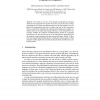Free Online Productivity Tools
i2Speak
i2Symbol
i2OCR
iTex2Img
iWeb2Print
iWeb2Shot
i2Type
iPdf2Split
iPdf2Merge
i2Bopomofo
i2Arabic
i2Style
i2Image
i2PDF
iLatex2Rtf
Sci2ools
153
click to vote
AGP
2010
IEEE
2010
IEEE
The Transformational Approach to Program Development
We present an overview of the program transformation techniques which have been proposed over the past twenty-five years in the context of logic programming. We consider the approach based on rules and strategies. First, we present the transformation rules and we address the issue of their correctness. Then, we present the transformation strategies and, through some examples, we illustrate their use for improving program efficiency via the elimination of unnecessary variables, the reduction of nondeterminism, and the use of program specialization. We also describe the use of the transformation methodology for the synthesis of logic programs from first-order specifications. Finally, we illustrate some transformational techniques for verifying first-order properties of logic programs and their application to model checking for finite and infinite state concurrent systems.
AGP 2010 | Artificial Intelligence | Logic Programs | Program Transformation Techniques | Transformation Rules |
Related Content
| Added | 11 Aug 2010 |
| Updated | 11 Aug 2010 |
| Type | Conference |
| Year | 2010 |
| Where | AGP |
| Authors | Alberto Pettorossi, Maurizio Proietti, Valerio Senni |
Comments (0)

